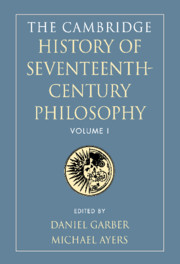Book contents
- Frontmatter
- Introduction
- I The context of seventeenth-century philosophy
- II Logic, language, and abstract objects
- III God
- IV Body and the physical world
- V Spirit
- 23 Soul and mind: life and thought in the seventeenth century
- 24 Knowledge of the soul
- 25 Mind–body problems
- 26 Personal identity
- 27 The passions in metaphysics and the theory of action
- Bibliographical appendix
- Bibliography
- References
24 - Knowledge of the soul
from V - Spirit
Published online by Cambridge University Press: 28 March 2008
- Frontmatter
- Introduction
- I The context of seventeenth-century philosophy
- II Logic, language, and abstract objects
- III God
- IV Body and the physical world
- V Spirit
- 23 Soul and mind: life and thought in the seventeenth century
- 24 Knowledge of the soul
- 25 Mind–body problems
- 26 Personal identity
- 27 The passions in metaphysics and the theory of action
- Bibliographical appendix
- Bibliography
- References
Summary
As Chapter 23 showed, a number of seventeenth-century philosophers grappled with the question, What is the soul? But they also pursued some related questions: How much can we know about the soul, and how do we gain that knowledge? In particular, do we know – and if we do, how do we know – that the soul exists? If it exists, what can we know of its nature? And where does our knowledge of the soul stand in relation to the rest of our knowledge? The scholastic doctrine that there is nothing in the intellect – not even its knowledge of itself – that does not come by way of the senses (nihil est in intellectu quod non fuerit in sensu) continued to play an important rôle in seventeenth-century thought, for it was accepted by the later-day schoolmen, who continued to be a dominant influence in the universities, as well as by some anti-scholastic philosophers, such as Hobbes and Gassendi, although it was rejected by Descartes and many other influential thinkers.
Accordingly, this chapter begins with an account of Saint Thomas Aquinas's views about our knowledge of the soul, for his doctrines provide the theoretical basis for the claim that even our knowledge of the soul must begin with our senses. Descartes's theory of self-knowledge is then traced in some detail, for his doctrinc, which departed radically from the Thomistic theory, provided a new framework within which much of the discussion of the topic was carried on during the rest of the century.
- Type
- Chapter
- Information
- The Cambridge History of Seventeenth-Century Philosophy , pp. 796 - 832Publisher: Cambridge University PressPrint publication year: 2000
References
- 2
- Cited by



